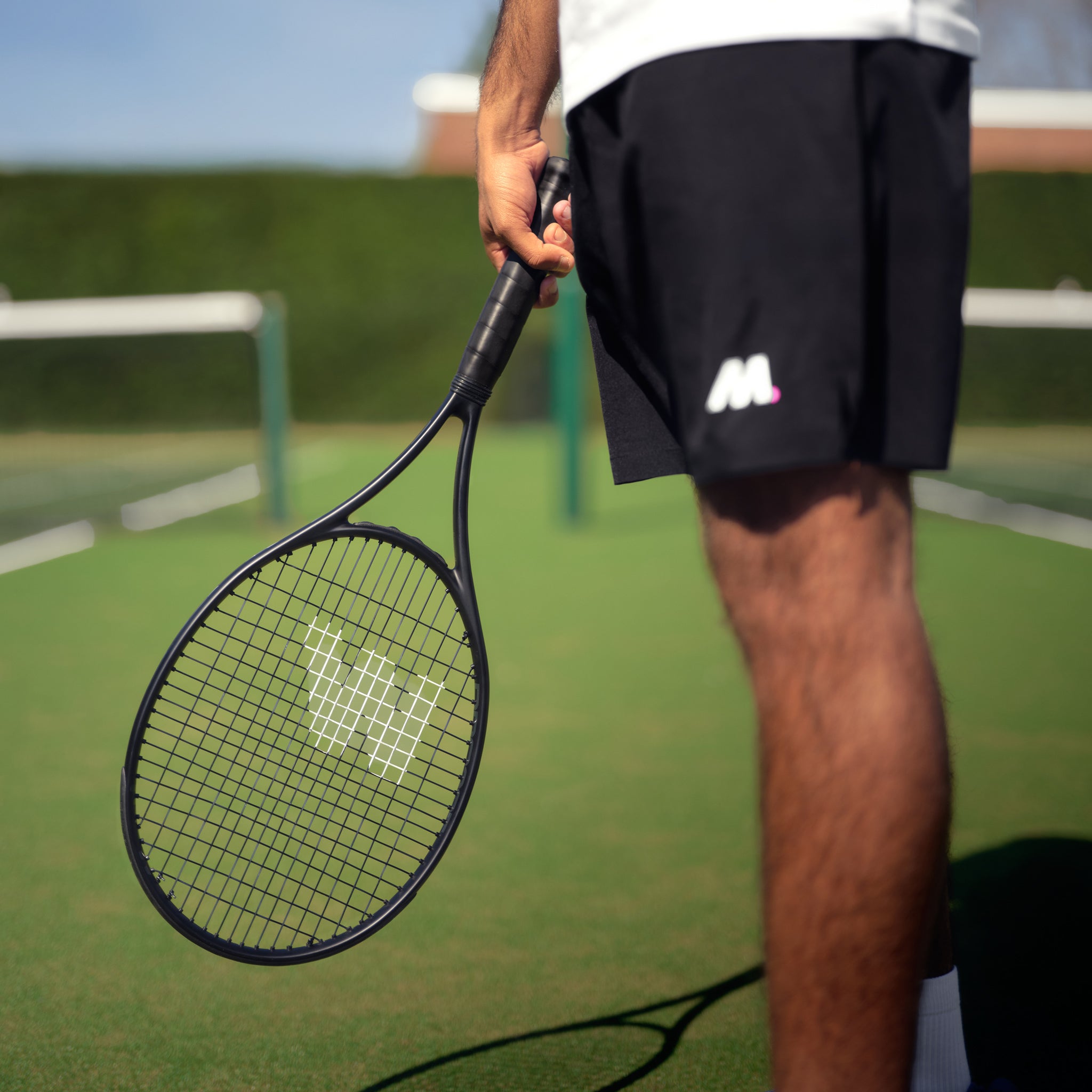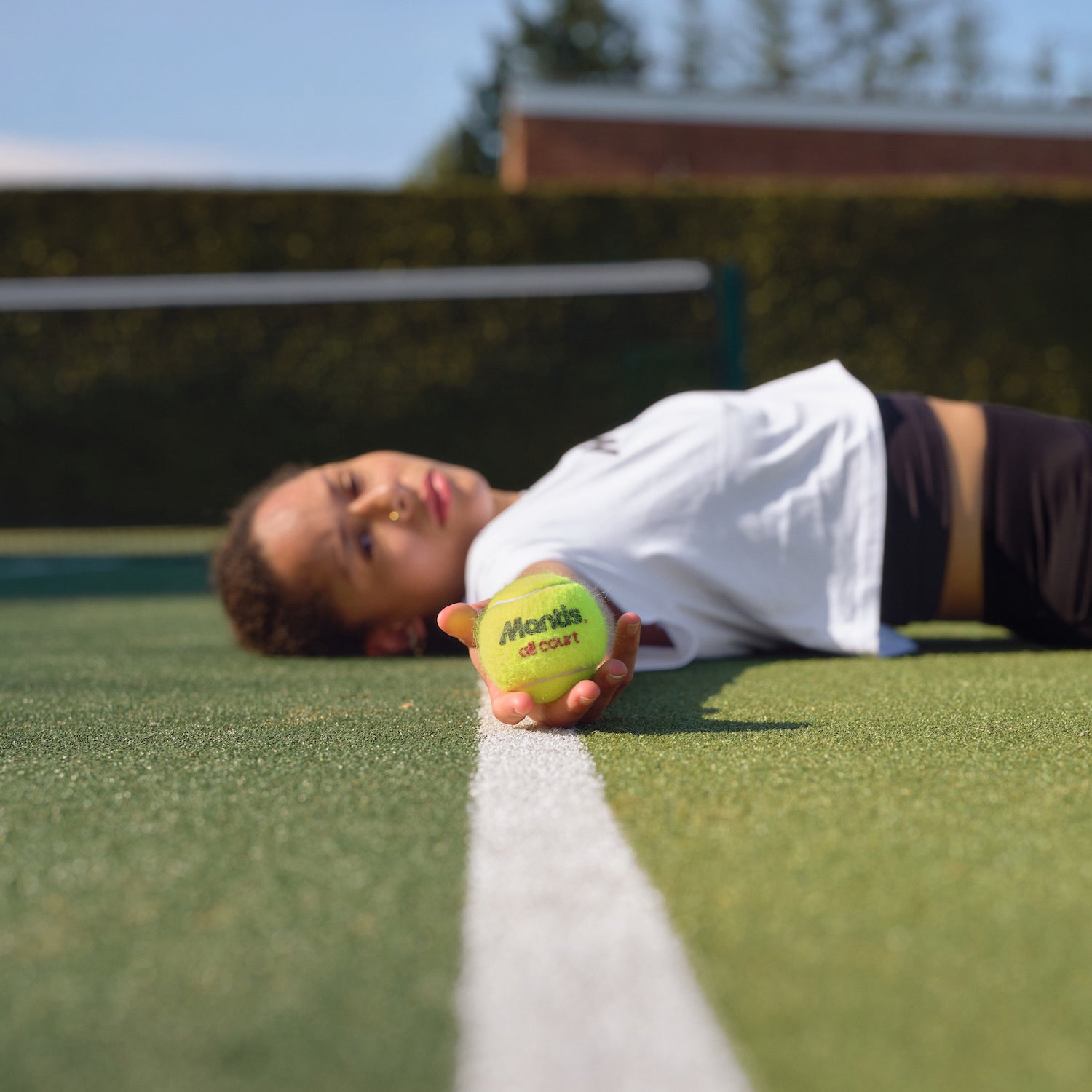
Finding the right tennis coach is probably the single best investment you can make in your game. It doesn't matter if you're just picking up a racquet for the first time or you're a seasoned player trying to iron out the kinks for competitive play. It's about finding a partner who sees your game, spots the weaknesses, builds on your strengths, and guides your development in a way that just makes sense. At Mantis, we believe that understanding the nuances of online tennis instruction can also supplement this journey, but the core relationship with a coach is key.
What Are You Actually Looking For in a Coach?
Before you even start looking, the most important thing you can do is take an honest look at your own game. Here at Mantis, we've seen time and again that a bit of clarity upfront makes all the difference. When you truly understand your own abilities and what you want to achieve, you’ll find a coach who fits your journey perfectly, saving you a lot of time and money in the long run.
A good starting point is to think about what you actually need from a lesson. Are you a complete beginner who needs to learn the basic strokes from the ground up? Or are you a decent club player who wants to finally master that kick serve before the next tournament?
Pinpoint Your Tennis Goals
Once you know where you stand, it's time to set some clear goals. Simply saying "we want to get better" is too vague to be useful. You need specific, achievable targets to aim for.
Setting proper goals changes your search from finding any coach to finding the right coach. The expert who’s fantastic with junior development probably isn't the best choice for an adult trying to break into the local league scene.
Think about what kind of goals you have. They usually fall into one of these buckets:
- Technical: "I want to fix my forehand technique," or "I need a more reliable second serve."
- Tactical: "I need to learn how to build a point," or "I want to get smarter with my shot selection in doubles."
- Mental: "I need to stop getting so nervous in matches," or "How can I stay focused when I'm under pressure?"
- Fitness: "I want to improve my stamina for three-set matches," or "I need to get faster around the court."
By figuring out if your main focus is on technique, tactics, or mental toughness, you can narrow your search to coaches who have a proven track record in that specific area. This makes sure every lesson is on-point and productive from day one.
Ultimately, doing this prep work means you can ask much better questions when you start talking to potential coaches. You'll walk into that first conversation knowing exactly what you need, which makes it far easier to spot the professional who can deliver real results and help you become the player you want to be. For anyone interested in the coaching industry itself, RacketBusiness.com offers some great professional insights.
Getting to Grips with UK Tennis Coaching Qualifications
In the UK, the Lawn Tennis Association (LTA) has a really clear, structured pathway for coaches. Think of it as a ladder of expertise. Knowing what the different rungs on that ladder mean is your first step to finding the right person to guide your game.
It's all about matching a coach's qualification level to what you actually want to achieve on court. A coach's LTA level tells you a lot about the kind of players and sessions they're qualified to handle. For instance, an LTA Level 1 is a coaching assistant – brilliant for helping out in group sessions but always under the watch of a more senior coach. A Level 2 coach can lead those sessions on their own, making them a solid choice for beginner groups.
Finding the Right Fit for Your Game
The LTA has laid out these certifications to make it easier for players to know what they're getting. If you're looking for one-on-one lessons or you've moved past the absolute basics, you'll want a coach with at least an LTA Level 3 qualification. These coaches are trained to work with beginners and improvers, both individually and in groups.
For more seasoned club players or anyone serious about competition, a Level 4 coach is the target. They've dived much deeper into advanced technical and tactical skills. At the very top, you've got the Level 5 Master Coach, who typically works with high-performance and professional athletes.
This infographic breaks down the key things to look for when you're making your choice.
As you can see, the official certification is just one piece of the puzzle, sitting alongside their actual on-court experience and how well you connect with them.
Why You Should Always Check Their Credentials
Checking a coach's credentials isn't just a formality; it’s about making sure you're in safe, professional hands. It’s a quality-control check. Any LTA-accredited coach must have a current DBS check (Disclosure and Barring Service), up-to-date first aid training, and safeguarding qualifications.
Choosing an accredited tennis coach means you’re getting more than just a hitting partner. You're partnering with a professional who is committed to ongoing learning and is held to the highest safety and ethical standards by the sport's governing body.
This simple check gives you complete peace of mind. You know the person you're working with is not only skilled in tennis but is also dedicated to creating a safe and positive environment. Don't be shy about asking to see their LTA accreditation – any genuine professional will be more than happy to show you.
Where to Find and How to Vet Your Next Coach
Knowing what you’re looking for in a coach is a great start, but the real legwork begins when you try to find them. So, where do you actually look?
A brilliant starting point is the official LTA coach finder. It's a reliable database of accredited pros. But don't stop there. Sometimes the best leads are found closer to home—check out your local club’s notice board or have a look through our own guide at https://mantissport.com/pages/tennis-coaches-and-clubs.
Never underestimate the power of a good old-fashioned recommendation. If you admire how someone at your club plays, ask them who they train with. A personal referral from a trusted source is often the most reliable way to find a great match.
Your Vetting Checklist: The Non-Negotiables and Beyond
Once you've got a shortlist, it's time for some due diligence. This isn't just about finding a good coach; it’s about making sure they are a credible, safe professional. Think of it as protecting your investment in your game.
First, let's cover the absolute essentials. Any coach you consider must have:
- Current LTA accreditation
- Public liability insurance
- An up-to-date DBS check
These are the non-negotiables. If a coach can't provide these, walk away.
Beyond the paperwork, you need to find out if they're the right person for you. An initial chat over the phone or at the club is perfect for this. You're trying to get a feel for their personality and approach.
Consider asking about their coaching philosophy—how do they see player development? Also, think about their communication style. Do they explain things in a way that clicks with you? For junior players, peace of mind is paramount, so ensuring thorough background checks, including court record checks, is a sensible step.
This initial conversation is your chance to see if you genuinely connect. A great coach knows how to adapt their style, but a natural rapport from the get-go makes the whole process smoother and, frankly, a lot more fun.
Ultimately, vetting a coach is more than just ticking boxes on a list. It’s about finding a partner in your tennis journey—someone whose expertise and personality will genuinely inspire you to get out on the court and play your absolute best.
What to Look For in a Trial Lesson
Think of a trial lesson as your one chance to really see a coach in action before you commit. It’s more than just a hit-around; it's a live audition. You get to move past their CV and see if their on-court personality and coaching style actually click with yours. We believe this first session is less about how well you play and much more about how well they can help you play better. While online tennis instruction can be a great supplement, nothing beats this crucial in-person test drive.
The very first thing you'll notice is their communication style. Are they clear? Encouraging? Do they give constructive feedback, or do they just shout corrections from the other side of the net? A top-notch coach won’t just bark orders; they’ll explain the why behind their advice. Pay close attention to how they give you pointers. It should be specific and something you can actually use, not just a vague "hit the ball harder."
Analysing Their Coaching Method
A great coach will quickly pinpoint one or two key things in your game to work on, without overwhelming you with a laundry list of faults. They should offer immediate, practical advice you can put into practice right there on the court. For instance, instead of just saying "your footwork is slow," a better coach might demonstrate a specific split-step technique to improve your timing.
This is where you see their coaching philosophy come to life. Do they have targeted drills ready to go for your specific weaknesses? It's always a good sign when a coach explains the purpose behind an exercise, not just how to do it.
A trial lesson isn’t just about hitting tennis balls. It's an interactive interview where you assess the coach's ability to diagnose issues, communicate solutions, and create a positive learning environment.
Key Observation Points
To get the most out of your trial, go in with a mental checklist. This will help you step back and assess the experience objectively after you've left the court.
Here's what to watch for:
- Observation Skills: Did they pick up on the small, subtle details in your technique or your on-court decisions?
- Instructional Clarity: Was their advice easy to grasp and apply straight away?
- Engagement and Energy: Did they seem genuinely invested in helping you improve, or were they just going through the motions?
- Problem-Solving: If you didn't quite get something, did they find a different way to explain or demonstrate it?
Ultimately, you should walk away from the lesson feeling like you’ve learned something genuinely useful and, just as importantly, feeling excited to get back on the court. That spark is what you’re looking for. Finding a coach who ignites it is the real secret to unlocking your potential.
The Real Cost of Hiring a Tennis Coach in the UK
Let's talk about the bottom line. Investing in a tennis coach is arguably the fastest way to sharpen your skills, but it's important to go in with your eyes open about the costs. We want you to build a great, long-lasting relationship with a coach, and that starts with understanding what to budget.
So, what drives the price? It really comes down to a few things: the coach's LTA qualification level, their years on the court, and where in the UK they're based. You can bet that a top-tier coach in central London will have a different hourly rate than a great, newly qualified coach in a smaller town up north. For a brilliant deep dive into the industry, RacketBusiness.com offers fantastic insights for tennis professionals.
Private Lessons Versus Group Sessions
One of the first decisions you'll make is whether to go for one-on-one lessons or join a group. Both have their merits, and the right choice often depends on your goals and your wallet.
-
Private Lessons: This is your fast track. You get the coach's undivided attention, letting you iron out that tricky backhand or nail down a specific match strategy. The price for this focused time can range from £25 to over £70 per hour.
-
Group Sessions: A fantastic, budget-friendly choice. You'll get to drill with other players in a more social setting, which is perfect for building consistency and learning general tactics. Expect to pay somewhere between £10 and £20 per person for a typical hour-long session.
A mix-and-match approach works wonders for many players. You could join a weekly group session to keep your rhythm and then book a private lesson once a month to work on something specific.
On average, a UK tennis coach charges around £28 per hour, but that figure can be misleading. Location plays a massive part. With higher court hire fees and living costs, coaches in London and the South East will naturally be at the upper end of the scale. Knowing this from the outset helps you plan your tennis budget and find a coaching setup that truly works for you.
Common Questions About Finding a Tennis Coach
It's completely normal to have a bunch of questions when you start looking for a tennis coach. You’re about to invest your time, money, and energy, so getting clear answers is the best way to feel confident you're on the right track. We hear a lot of the same queries, so we've put together some advice based on years of experience.
To really get what makes a great coach tick, it helps to look at what coaching looks like at the highest levels. The bar in competitive tennis is set incredibly high, and the best coaches are the ones who consistently get results that end up influencing the rest of the sport. Think about top-tier university tennis, where coaches guide teams to undefeated seasons and championship titles—that's the kind of tactical and technical know-how we're talking about.
How Often Should I Have Lessons?
There’s no magic number here; it all comes down to your personal goals and how quickly you’re hoping to improve.
For most club players and adults looking to sharpen their skills, having one lesson a week is a great starting point. It gives you regular, expert feedback and, crucially, leaves you enough time to get out on court yourself and actually practise what you’ve worked on.
If you’re a competitive junior player or an adult with serious tournament ambitions, you'll likely want to ramp that up. Two or even three sessions a week can really fast-track your development, especially when you're mixing those lessons with plenty of match play.
The real secret isn't just the number of lessons you take. It's what you do in between them. A single, focused lesson followed by two or three solid practice sessions on your own will almost always be more valuable than three lessons with zero independent practice.
What If I’m Not Making Progress?
Feeling like you’ve hit a plateau is one of the most frustrating things in tennis, especially when you're putting in the time with a coach. If you feel stuck in a rut, the very first thing to do is talk to your tennis coach.
Be open about it. Just explain how you're feeling and ask for their take. Any good coach will appreciate the honesty and should be ready to mix things up, maybe by introducing new drills, changing the focus of your sessions, or trying a different tactical approach.
If you’ve tried a new strategy and still feel like you’re spinning your wheels, it might be time to think about a change. It doesn't automatically mean your coach is bad! It could just be that their style isn't the right fit for you anymore, or you simply need a fresh perspective on your game. It’s a common issue, and many coaching platforms even address it directly.
Here at Mantis, our goal is to create equipment that supports your development at every stage of your tennis journey. From high-performance rackets designed for precision to durable, tour-grade tennis balls built to last, our gear is engineered for players serious about improvement. Explore our full range of products at https://mantissport.com and find the right tools to take your game to the next level.










